Published in Nacional number 668, 2008-09-02
Sprint through Croatia
Code of honour among Japanese tourists
There will be three times more tourists from Japan this year than last; one group was joined by a Nacional team of reporters who wanted to discover what they like, and what turns them off – and discovered some unusual and strict customs among these visitors from the Far East
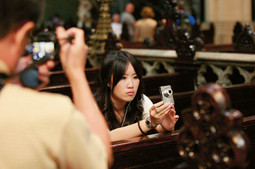 However much talk there was over recent years about the rising number of Japanese tourists in Croatian, the Japanese have this year completely surpassed all of the figures published ot date: about 70,000 came to Croatia just in this year's pre-peak season period, which is almost as many as came during all of last year. We decided to discover the reason why Croatia is enjoying this level of popularity from a group of Japanese from the city of Nagoya, which visited Croatia last week on a Generalturist vacation package. And although it was a group with many elderly members, their itinerary was of a quite high tempo – during the remaining five days, after having lost three on the arrival and departure, they visited two states and seven tourist destinations. Known for their quick sightseeing tempo and a steely discipline the likes of which is not possessed by tourists from other countries, the program of the group from Nagoya was not much different from other packages Japanese agencies set up with their Croatian counterparts.
However much talk there was over recent years about the rising number of Japanese tourists in Croatian, the Japanese have this year completely surpassed all of the figures published ot date: about 70,000 came to Croatia just in this year's pre-peak season period, which is almost as many as came during all of last year. We decided to discover the reason why Croatia is enjoying this level of popularity from a group of Japanese from the city of Nagoya, which visited Croatia last week on a Generalturist vacation package. And although it was a group with many elderly members, their itinerary was of a quite high tempo – during the remaining five days, after having lost three on the arrival and departure, they visited two states and seven tourist destinations. Known for their quick sightseeing tempo and a steely discipline the likes of which is not possessed by tourists from other countries, the program of the group from Nagoya was not much different from other packages Japanese agencies set up with their Croatian counterparts.
Immediately upon touching down in Klagenfurt they toured Bled and Postojna and made it Zagreb that same evening, and after a morning sightseeing tour, headed out for Plitvice Lakes. After having slept there they made it to Split, toured it and Trogir, slept and head out for Dubrovnik, the only place they stayed for two days. They made there way home spending hours changing flights from Dubrovnik-Zagreb, Zagreb-Amsterdam, Amsterdam-Helsinki, Helsinki-Nagoya. The guide says that pensioner groups travel at the same tempo, and that they are in fact more frequent guests "because they have solid incomes and plenty of time".
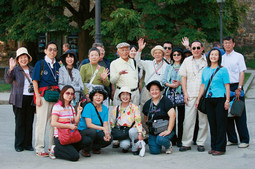 A group of Japanese tourists from Nagoya made a quick sightseeing tour of Zagreb, only to visit Plitvice Lakes, Split, Trogir and Dubrovnik in the following few days "They have to experience a lot everywhere, see, taste and film everything. They simply must see everything they have paid for, regardless of weariness, bad weather or other circumstances", says Zagreb tourist guide Seka Verzi, who led the group from Nagoya through Zagreb. "Other tourists often say: 'We can skip this, we are a little tired.' Not the Japanese." Kotomi Okino, the leader of the Japanese group explained it simply: "The Japanese have very short holidays, some ten days. They want to use that time to the fullest and see as much as they can."
A group of Japanese tourists from Nagoya made a quick sightseeing tour of Zagreb, only to visit Plitvice Lakes, Split, Trogir and Dubrovnik in the following few days "They have to experience a lot everywhere, see, taste and film everything. They simply must see everything they have paid for, regardless of weariness, bad weather or other circumstances", says Zagreb tourist guide Seka Verzi, who led the group from Nagoya through Zagreb. "Other tourists often say: 'We can skip this, we are a little tired.' Not the Japanese." Kotomi Okino, the leader of the Japanese group explained it simply: "The Japanese have very short holidays, some ten days. They want to use that time to the fullest and see as much as they can."
Joining the group during its sightseeing tour of Zagreb we observed how they reacted to things and tried to find out why they chose Croatia this year, how they experienced it and what there expectations had been. But it was not an easy task: with a poor knowledge of English, and as restrained and disciplined as they are, the Japanese showed no reactions during the sightseeing. They quietly followed the guide from Gornji grad (the old town core) to the old Kamenita vrata town gate to Dolac market and the cathedral, listening attentively with the odd rare comment made among the group. Tourist guides say that their level of interest is best gauged only by how often they shoot photos of a scene. They are almost obedient in photographing almost everything that the guide points out – even things like the plaque that bears the name of the old town street, 29 October 1918, after it was explained that that was the day Croatia ceased to be a part of the Austro-Hungarian Empire. They spent the longest taking pictures of the Zagreb skyline, which based on the cited theory, means that that was what interested them the most. Also particularly interesting were centuries old Catholic churches, since there are none in Japan as a result of the brutal persecution of Catholic missionaries there in the 16th and 17th centuries.
"When we hear church bells, we know that we are in Europe", says 35-year-old Ayako Tsuge, an employee of a Japanese insurance company, who came to Croatia with her mother. With great difficulty, but exceptional tenacity, she endeavoured to say in English that she chose Croatia because of the "nice places for sightseeing." She proudly pointed out that all Japanese know of Dubrovnik and Plitvice Lakes, and of the "war of independence in which many buildings were destroyed." Like most of the people in the group she has already toured England, France, Spain and Italy and, citing an advantage of Croatia compared to those countries she said that there were no Japanese tourists here.
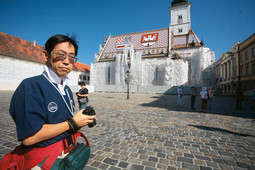 A group of Japanese tourists from Nagoya made a quick sightseeing tour of Zagreb, only to visit Plitvice Lakes, Split, Trogir and Dubrovnik in the following few days "There are few Japanese here, so we can enjoy the atmosphere. In Paris and London there are so many of them that we feel like we are in Japan." Croatians appear to her as "very intelligent and industrialised", and in Zagreb she was most impressed by the Dolac market. "It is wonderful that everything is in the open, that you can choose the fruit by hand. In our country all the food is wrapped in plastic." English is a bigger problem and few in the group can speak it, and frequently the Japanese tour guides also speak English poorly. That was the case with Kotomi Okino, the leader of the group from Nagoya. Although she understands it, she was hard put to it to explain why the Japanese like to come to Croatia as of late: "They like to come to all of Europe, where the cultural heritage is entirely different from what we have at home. As they can for the most part afford it, the Japanese occupy Europe during the summer. After touring the most attractive European countries, they seek a new destination. Currently, that is Croatia."
A group of Japanese tourists from Nagoya made a quick sightseeing tour of Zagreb, only to visit Plitvice Lakes, Split, Trogir and Dubrovnik in the following few days "There are few Japanese here, so we can enjoy the atmosphere. In Paris and London there are so many of them that we feel like we are in Japan." Croatians appear to her as "very intelligent and industrialised", and in Zagreb she was most impressed by the Dolac market. "It is wonderful that everything is in the open, that you can choose the fruit by hand. In our country all the food is wrapped in plastic." English is a bigger problem and few in the group can speak it, and frequently the Japanese tour guides also speak English poorly. That was the case with Kotomi Okino, the leader of the group from Nagoya. Although she understands it, she was hard put to it to explain why the Japanese like to come to Croatia as of late: "They like to come to all of Europe, where the cultural heritage is entirely different from what we have at home. As they can for the most part afford it, the Japanese occupy Europe during the summer. After touring the most attractive European countries, they seek a new destination. Currently, that is Croatia."
"They are like that, when one goes, other follow in waves", says Zagreb tourist guide Seka Verzi, who has been leading Japanese groups since 1989, when they first started coming to Croatia. After that, she says, the Japanese stopped coming because of the war, only to start coming again in 2000 in greater numbers every year. For tourist guides they are, she says, the most appreciated visitors. "They are polite, composed, on-time and fantastically tidy. Chauffeurs love them: they do not leave even a not a scrap of paper in buses, unlike groups from some other countries who can be indescribably untidy, loud and undisciplined. They are also very discrete when it comes to making complaints; they always respect hierarchy and complain only to their own guide who then works it out with the Croatian counterpart – as a rule you never know whether they are satisfied or not. Tourists from other countries are known to harass you, yell, grumble and complain incessantly."
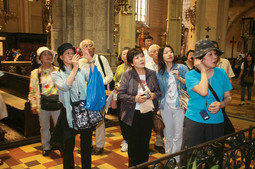 THE CATHEDRAL is, for the Japanese, a very exotic place Of Croatians the group from Nagoya says that they are nice, amiable and receptive. "You smile a lot", says Miyako Yamanaka, a secondary school English teacher. She too does not speak fluently, but with greater ease, nevertheless, than the others. She asks what grade people start learning English here and says that in Japan they start only from the seventh grade of primary school. She is in Croatia at the choice of her husband Mihoa, a pharmacist, with whom she has already toured "all of the major European countries." Travelling with them is their 23-year-old daughter Tsuneo, who recently graduated economics and found employment at a Japanese bank. What she likes most about Croatia is the sense of safety: "In all European cities so far we have had to watch out for our purses. It is wonderful that you do not have to think about that here."
THE CATHEDRAL is, for the Japanese, a very exotic place Of Croatians the group from Nagoya says that they are nice, amiable and receptive. "You smile a lot", says Miyako Yamanaka, a secondary school English teacher. She too does not speak fluently, but with greater ease, nevertheless, than the others. She asks what grade people start learning English here and says that in Japan they start only from the seventh grade of primary school. She is in Croatia at the choice of her husband Mihoa, a pharmacist, with whom she has already toured "all of the major European countries." Travelling with them is their 23-year-old daughter Tsuneo, who recently graduated economics and found employment at a Japanese bank. What she likes most about Croatia is the sense of safety: "In all European cities so far we have had to watch out for our purses. It is wonderful that you do not have to think about that here."
Even though Miyako Yamanaka told us that it is rare that younger people travel with their parents, there was another complete family in the group from Nagoya. Harumi Oizumi came to Croatia with her parents, who own a textile shop in Nagoya, on the recommendation of a Japanese tourism agency. As far as Zagreb is concerned, says Seka Verzi, they find it nice, and like it most when the tourist guide links something they see with something they know: "For example the train station is interesting to them when they hear that the Orient express passed here, and when we bring Agatha Christie into the story, whose book mentions a murder near Vinkovci – they immediately take several photos of the train station. But I do not go into too much detail so as not to confuse them. And you have to bear in mind that it is completely different when you do not address people directly, which is the case only with the Japanese. Only they have earphones on to hear the guide, and you have no idea what of your words are passed on to them." She says that they do not buy many souvenirs. For the most part they have heard that the necktie originated in Croatia and ask to visit the Zagreb shop of the Croata kravate, and buy some fruit, homemade honey or teas at Dolac.
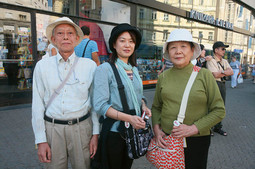 The Oizumi family of Nagoya "They do not like to spend of trifles, which goes for all social classes. With them it is hard to tell who is wealthier, as they all dress decently. Their social status might be evident from the hotel they stay in. But they can all afford to travel." The Japanese often have unusual requests. They are best known for the fact that, adhering strictly to their hierarchical rules, they insist that their guides, both Japanese and Croatian, always sleep on the floor below theirs in hotels. That is frequently as source of big problems for Croatian guides, because it is not always possible. They are also bothered if everybody does not get the same – rooms of the same size, even coffee cups.
The Oizumi family of Nagoya "They do not like to spend of trifles, which goes for all social classes. With them it is hard to tell who is wealthier, as they all dress decently. Their social status might be evident from the hotel they stay in. But they can all afford to travel." The Japanese often have unusual requests. They are best known for the fact that, adhering strictly to their hierarchical rules, they insist that their guides, both Japanese and Croatian, always sleep on the floor below theirs in hotels. That is frequently as source of big problems for Croatian guides, because it is not always possible. They are also bothered if everybody does not get the same – rooms of the same size, even coffee cups.
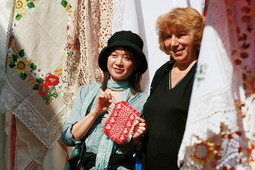 DURING SIGHTSEEING the Japanese are quiet and disciplined and their level of interest can be measured only by counting the number of photographs taken "They all paid the same and simply have to get the same", says Seka Verzi. Japanese tour guides are known for requesting that the Croatian guide checks all the rooms before the group arrives, to see of they are all the same size and have hot water, to check the telephones and showers, test all of the lights and flush all of the toilets to see if everything is in working order. It all sounded crazy until the group leader Kotomi Okino began telling of experiences in Croatia, groups she had led in June. "Croatia has very interesting cities. Visitors like Croatia, but not the service here. There were many problems with local hotels in June. Some did not have hot water, which is very important for the Japanese because they like hot baths. In one hotel a light did not work in one of the rooms, and we were told at the reception that there was nobody there at the moment that could change the light bulb. In on hotel there were no hairdryers, just one for the entire hotel. Once in a hotel everybody got a different room. In uncomfortable situations I explain to the guests that Croatia is a young country that has been around for only 17 years, that it had suffered a war and that it has not had tourism for long. They understand and do not get upset, but I hope that it will be better next year."
DURING SIGHTSEEING the Japanese are quiet and disciplined and their level of interest can be measured only by counting the number of photographs taken "They all paid the same and simply have to get the same", says Seka Verzi. Japanese tour guides are known for requesting that the Croatian guide checks all the rooms before the group arrives, to see of they are all the same size and have hot water, to check the telephones and showers, test all of the lights and flush all of the toilets to see if everything is in working order. It all sounded crazy until the group leader Kotomi Okino began telling of experiences in Croatia, groups she had led in June. "Croatia has very interesting cities. Visitors like Croatia, but not the service here. There were many problems with local hotels in June. Some did not have hot water, which is very important for the Japanese because they like hot baths. In one hotel a light did not work in one of the rooms, and we were told at the reception that there was nobody there at the moment that could change the light bulb. In on hotel there were no hairdryers, just one for the entire hotel. Once in a hotel everybody got a different room. In uncomfortable situations I explain to the guests that Croatia is a young country that has been around for only 17 years, that it had suffered a war and that it has not had tourism for long. They understand and do not get upset, but I hope that it will be better next year."
Related articles
Šeks and Vidošević hold secret dinner meeting
José Carreras, one of the world's best known tenors, performed in Zadar for a audience of three and a half thousand, but some did not come to Zadar… Više
Latest news
-
28.10.2010. / 14:15
'A profitable INA is in everyone's interest'
-
28.10.2010. / 09:38
Sanader’s eight fear SDP — Won’t bring down Government
-
21.10.2010. / 15:02
Interior Ministry turned a blind eye on Pukanic assassination
-
20.10.2010. / 09:34
Barisic could bankrupt HDZ




